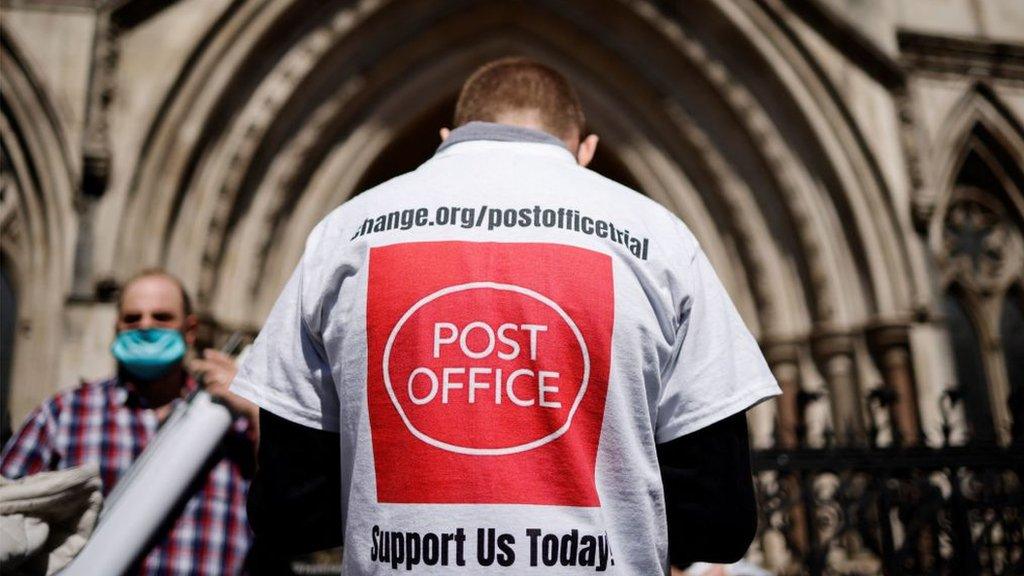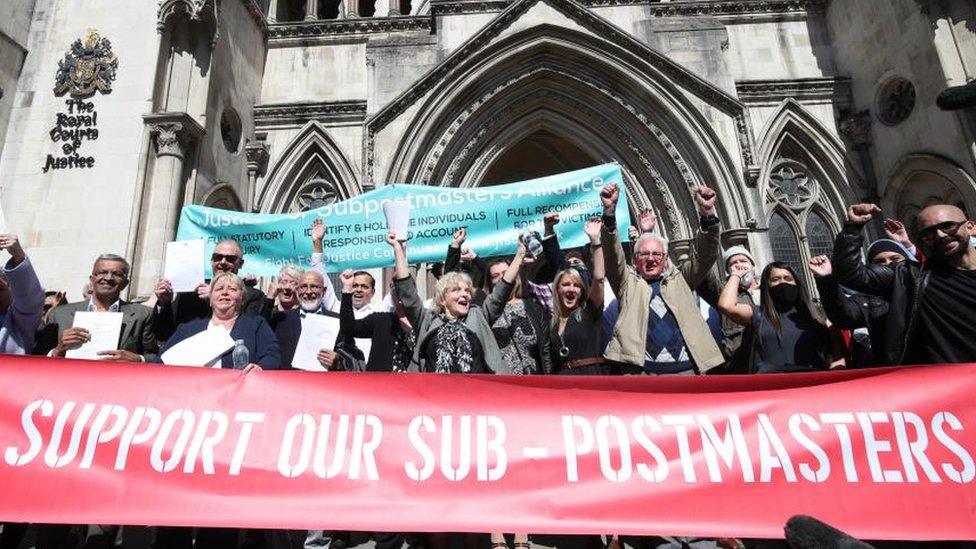Post Office scandal victims set to be cleared by new law
- Published
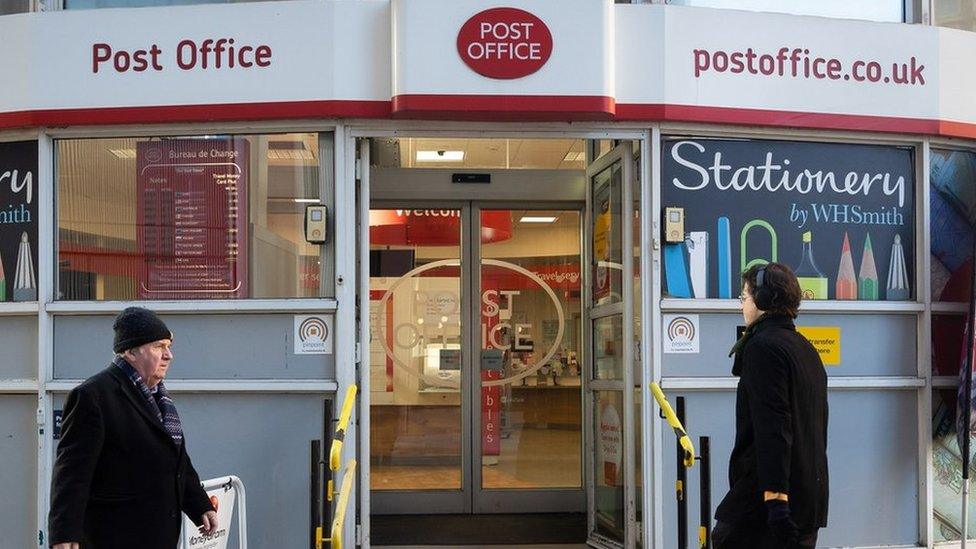
Hundreds of people wrongly convicted in the Post Office scandal are set to have their names cleared under new legislation planned by the government.
The law is expected to come into effect by the end of July and will apply to convictions in England and Wales.
It will apply to convictions meeting specific criteria and is expected to clear the majority of victims.
The government said the possible exoneration of some genuinely guilty of crimes was "a price worth paying".
Between 1999 and 2015, more than 900 sub-postmasters were wrongly prosecuted due to faulty software.
Incorrect information provided by a computer system called Horizon, developed by Japanese firm Fujitsu, meant that sub-postmasters and postmistresses were prosecuted for stealing money.
Many of those convicted went to prison for false accounting and theft. Many were financially ruined.
Some sub-postmasters caught up in the scandal have died or taken their own lives in the intervening years. So far, 102 convictions have been overturned.
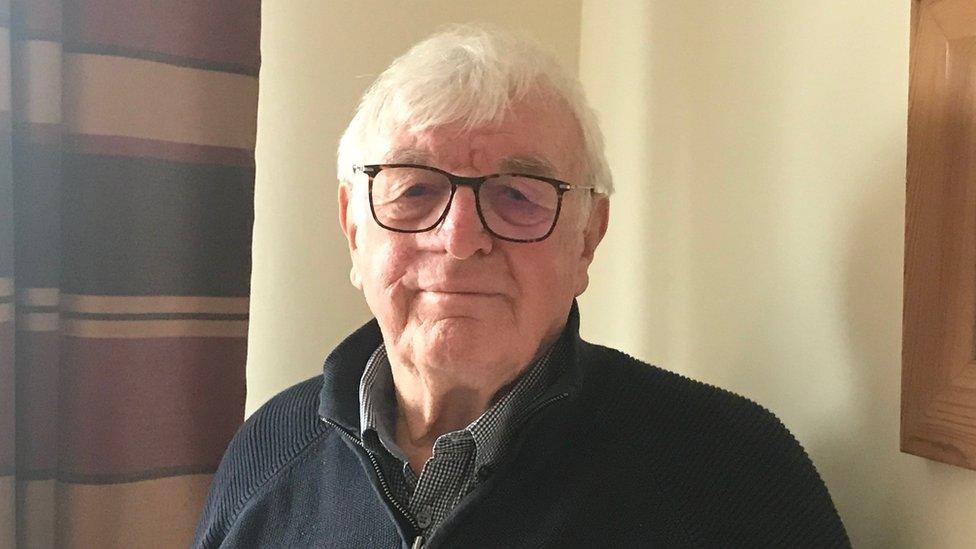
Keith Bell, who is now 75, wants his name cleared
Keith Bell had been a sub-postmaster in Stockton-on-Tees since 1985, but like hundreds of others, he started noticing discrepancies in his accounts after Horizon was installed in his branch.
He called Post Office helplines, but was given little support. He spent more than £12,000 of his own money to make up the shortfalls, and eventually delayed some transactions to try to balance the books.
He was convicted of false accounting in 2002 and had to do 200 hours of community service.
He didn't challenge his conviction at the time, as he didn't have the means to take on the Post Office, and he believed he had been at fault.
But now the 75-year-old wants his name cleared and expects his conviction to be quashed.
"I'm relieved they are going to quash all the convictions, which is long overdue," he said in response to the announcement on Thursday. "It's a relief to be able to talk to friends. It's a relief to be able to look people in the eye now."
The issue was thrust back into the spotlight by an ITV drama, Mr Bates vs the Post Office, earlier this year.
Criticism had said that the process for overturning convictions and getting compensation was far too slow.
There are three main schemes aimed at groups of victims who had different experiences of the scandal - but the schemes have been accused of being long-winded and complicated.
Announcing the plans, Post Office Minister Kevin Hollinrake said the legislation was likely to "exonerate a number of people who were, in fact, guilty of a crime".
But he said: "The government accepts that this is a price worth paying in order to ensure that many innocent people are exonerated."
Some 700 people were prosecuted by the Post Office. Another 283 cases were brought by other agencies including the Crown Prosecution Service (CPS) and the Department for Work and Pensions (DWP).
Prosecutions by the DWP will not be quashed under the new law.
A letter released by the Post Office, external after Mr Hollinrake's statement showed that its chief executive, Nick Read, had written to Justice Secretary Alex Chalk last month saying that the company "would be bound to oppose an appeal" in more than half the cases it had prosecuted.
It said that these cases "involve convictions obtained by reliance on evidence unrelated to the Horizon computer system," and numbered 369, with a further 11 still under review.
The letter was sent on 9 January, shortly before the government first announced plans to use emergency legislation to exonerate all sub-postmasters.
However, the Post Office said the letter was "in no way seeking to persuade government against mass exoneration".
It said the purpose of the letter was "primarily to offer the government any support that might assist them as they consider relevant issues in advance of passing legislation, without any value judgement on what the correct course of action might be".
'Key questions'
Mr Hollinrake said the new legislation would overturn all convictions that met certain criteria. It will only cover:
convictions from the Post Office and CPS
"relevant offences", such as theft and false accounting
sub-postmasters and their employees or family members
cases where the offence took place during the time that the Horizon system (and its pilots) was in operation
cases where the convicted person was working in a Post Office that was using the Horizon system software (including relevant pilot schemes)
cases in England and Wales
However, the government said it would work with the Scottish Government and Northern Ireland Executive to ensure their schemes to quash convictions were "compatible with the UK compensation scheme".
Labour MP Kevan Jones said he welcomed news of the legislation but added it was vital that the government set aside enough time for the new law to be passed "as quickly as possible".
"There are some initial key questions that need answering, including whether the Post Office's Capture system counts as a 'pilot' of the Horizon system for the purposes of this bill."
Mr Hollinrake added he recognised the "constitutional sensitivity" of the planned legislation, but added it did not set a precedent for the future relationship between the government, Parliament and the judiciary.
"The scale and circumstances of this prosecutorial misconduct demands an exceptional response," he said.
"We are keen to ensure that the legislation achieves its goal of bringing prompt justice to all of those who were wrongfully convicted as a result of the scandal, followed by rapid financial redress."
A spokesperson for DWP confirmed the new law would not apply to prosecutions brought by the department.
Between 2001 and 2006 "a small number" of Post Office staff were convicted for welfare-related fraud offences, mostly involving cashing in stolen benefit order books, they said.
"These criminal cases were not Horizon-related and followed lengthy, complex investigations, relying on multiple sources of evidence, including filmed surveillance, examination of stolen cashed orders and witness statements.
"While reference may have been made to Horizon in court, DWP did not rely on Horizon evidence to prove these cases, and this has been accepted by the Court of Appeal."


Are you affected by the issues raised in this story? Share your experiences by emailing haveyoursay@bbc.co.uk, external.
Please include a contact number if you are willing to speak to a BBC journalist. You can also get in touch in the following ways:
WhatsApp: +44 7756 165803
Tweet: @BBC_HaveYourSay, external
Please read our terms & conditions and privacy policy
If you are reading this page and can't see the form you will need to visit the mobile version of the BBC website to submit your question or comment or you can email us at HaveYourSay@bbc.co.uk, external. Please include your name, age and location with any submission.
Related topics
- Published21 February 2024
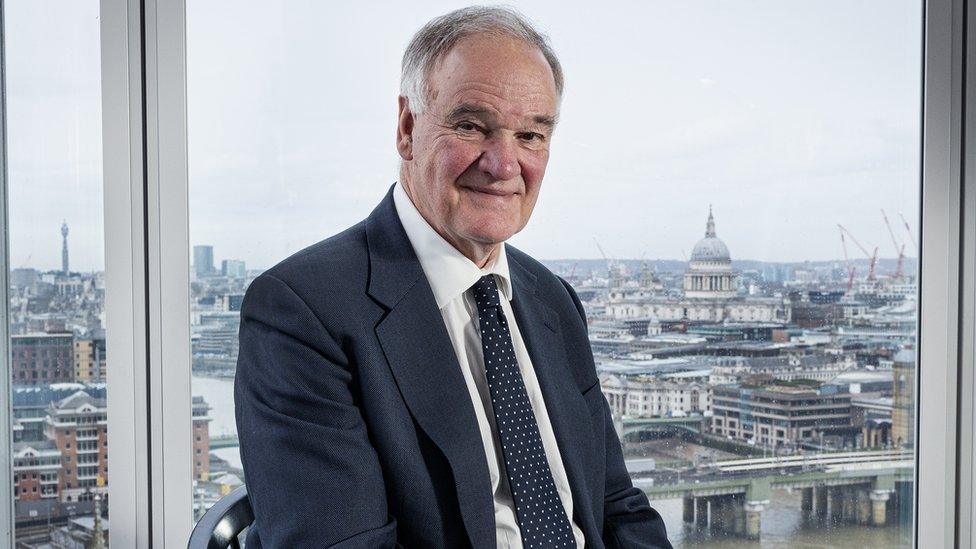
- Published11 January 2024
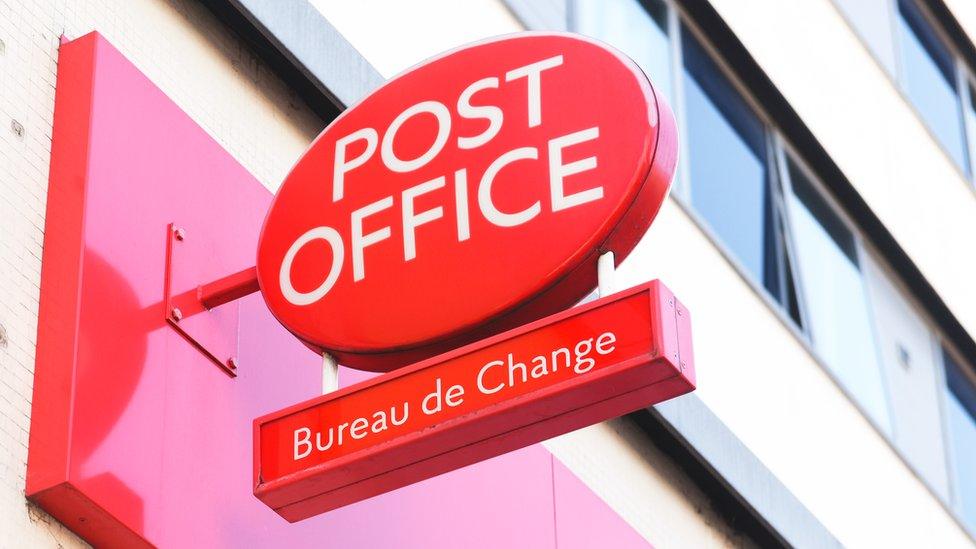
- Published22 February 2024

